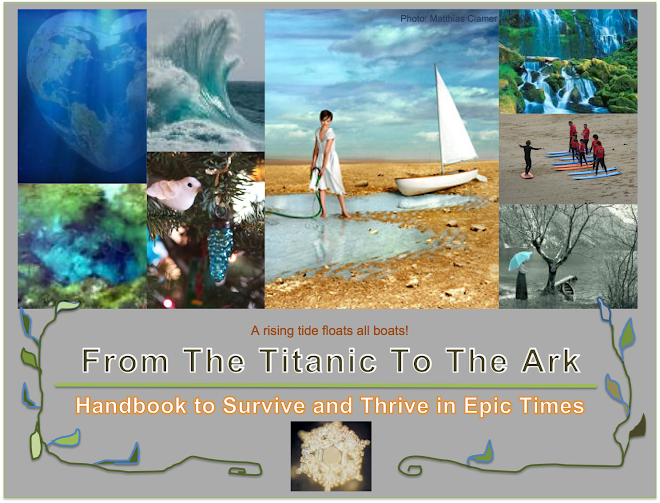Sunday, August 29, 2010
Right Brain Left Brain
"If you're not a content creator, wait a while. The 21st century is to content creators what the Industrial Revolution was to factory workers: In a world where information is superabundant, unique and creative ideas are hot-ticket advantages both personally and professionally. More and more people are finding more and more ways to parent, make money, find friends, and generally live well by relying on creativity. I've seen this shift among my life-coaching clients. For instance: Michaela develops financial-planning strategies for stay-at-home moms. Mary runs a long-distance mother's support group via Skype. Alyssa's innovative T-shirt designs keep selling, recession or no recession. The demand for creative thinking is both a challenge and an opportunity. It requires us to use more than the logical left-brain skills we learned in school. These days, we all need to get back into our right minds." Martha Beck
http://www.oprah.com/article/omagazine/200911-omag-beck-right-brain
‘Right brain’ thinking (Random, Intuitive, Holistic, Synthesizing, Subjective, Looks at wholes) instead of ‘left brain’ thinking (Logical, Sequential, Rational, Analytical, Objective, Looks at parts - taught to the masses since their earliest indoctrination sessions in schools) in tandem with heart intelligence, will lead us to creating our "Heaven on Earth"!
In his fascinating book The Talent Code, Daniel Coyle describes how the brain reacts when a person develops a new skill. Performing an action involves firing an electrical signal through a neural pathway; each time this happens, it thickens the myelin sheath that surrounds nerve fibers like the rubber coating on electrical wires. The thicker the myelin sheath around a neural pathway, the more easily and effectively we use it. Heavily myelinated pathways equal mad skills.
Throughout your education, you myelinated the left-brain pathways for thinking logically. You were prepared for predictability and order, not today's constant flood of innovation and change. Now you need to build up myelin sheaths around new skill circuits, located in your right hemisphere. To do this, you need something Coyle calls deep practice.
Deep practice is the same no matter what the skill. First visualize an ability you'd like to acquire—swimming like Dara Torres, painting like Grandma Moses, handling iron rods like Uncle Phineas. Then try to replicate that behavior. Initially, you'll fail. That's good; failure is an essential element of deep practice. Next, analyze your errors, noting exactly where your performance didn't match your ideal. Now try again. You'll still probably fail (remember, that's a good thing), but in Samuel Beckett's words, you'll "fail better."
http://www.oprah.com/article/omagazine/200911-omag-beck-right-brain
‘Right brain’ thinking (Random, Intuitive, Holistic, Synthesizing, Subjective, Looks at wholes) instead of ‘left brain’ thinking (Logical, Sequential, Rational, Analytical, Objective, Looks at parts - taught to the masses since their earliest indoctrination sessions in schools) in tandem with heart intelligence, will lead us to creating our "Heaven on Earth"!
In his fascinating book The Talent Code, Daniel Coyle describes how the brain reacts when a person develops a new skill. Performing an action involves firing an electrical signal through a neural pathway; each time this happens, it thickens the myelin sheath that surrounds nerve fibers like the rubber coating on electrical wires. The thicker the myelin sheath around a neural pathway, the more easily and effectively we use it. Heavily myelinated pathways equal mad skills.
Throughout your education, you myelinated the left-brain pathways for thinking logically. You were prepared for predictability and order, not today's constant flood of innovation and change. Now you need to build up myelin sheaths around new skill circuits, located in your right hemisphere. To do this, you need something Coyle calls deep practice.
Deep practice is the same no matter what the skill. First visualize an ability you'd like to acquire—swimming like Dara Torres, painting like Grandma Moses, handling iron rods like Uncle Phineas. Then try to replicate that behavior. Initially, you'll fail. That's good; failure is an essential element of deep practice. Next, analyze your errors, noting exactly where your performance didn't match your ideal. Now try again. You'll still probably fail (remember, that's a good thing), but in Samuel Beckett's words, you'll "fail better."
Subscribe to:
Post Comments (Atom)













0 comments:
Post a Comment